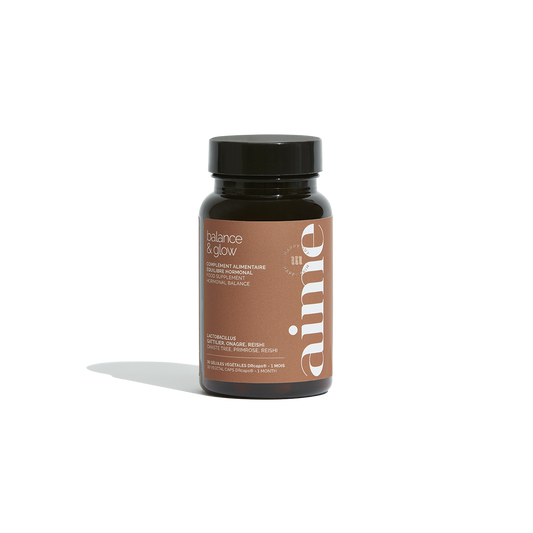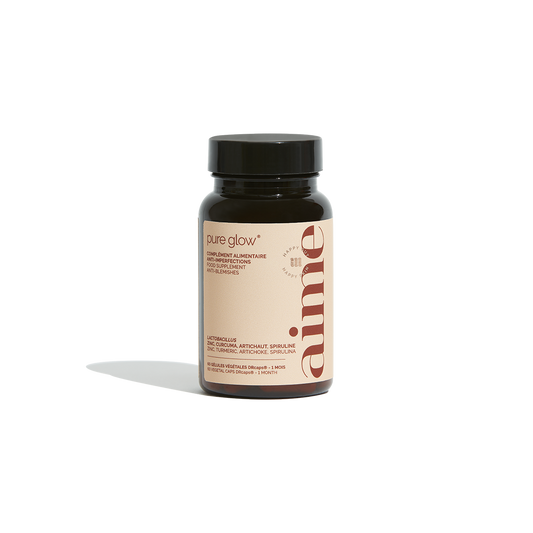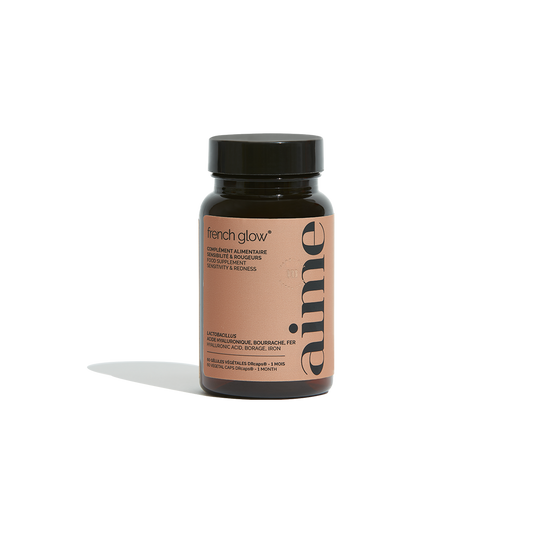Reinventing skincare by taking care of your gut first and foremost, in addition to cosmetic products, has been AIME's ambition since its creation in 2019.
It's the founder, Mathilde Lacombe, who says it best: " It was only when I started to take an interest in a more holistic approach, probiotics and the link between skin and diet that I was able to better understand my rosacea problems and, above all, to see results. From there, the idea was born to offer a new skincare routine combining food supplements and facial treatments to help all women, whatever their skin problems. "
Acne , rosacea , combination to oily skin prone to imperfections. AIME probiotic supplements address these issues in a targeted manner.
Which probiotics should you choose for different types of acne?
Pure Glow : This is the ideal formula for acne (known as juvenile acne) and blemishes. Composed of probiotics (Bifidobacterium lactis, Streptococcus thermophilus, Lactobacillus casei) to rebalance intestinal flora, it helps to deeply purify the skin thanks to anti-inflammatory and healing zinc and turmeric.
Its promise: healthier skin and breakouts that become less frequent and less noticeable!
Balance & Glow : Designed specifically to reduce and calm hormonal acne . Enriched with probiotics (Lactobacillus rhamnosus), evening primrose, chasteberry, broccoli extract and reishi, it rebalances the skin lastingly.
Its promise: soothed, healthy-looking skin.
And what probiotics against rosacea?
French Glow is designed for skin that suffers from rosacea , eczema, psoriasis, but not only. It is dedicated to normal to dry, sensitive, atopic skin or skin prone to redness in general.
Inside: three strains of probiotics (Lactobacillus acidophilus, Lactobacillus rhamnosus, Lactobacillus plantarum) and essential fatty acids, a bit like a moisturizer from the inside out!
How do probiotics work on the skin?
When the gut is healthy, everything is healthy! Probiotics have a direct impact on the beauty and quality of the skin. They can also positively influence the composition of the skin microbiome by stimulating the growth of beneficial bacteria, reducing harmful bacteria populations, and strengthening the skin barrier.
Their balancing role is very interesting in the long term since they help to alleviate the symptoms of acne, eczema or rosacea or to calm redness and irritation of sensitive or sensitized skin. Better balanced, the skin barrier is strengthened, which limits transepidermal water loss, for better overall hydration.
The right probiotic routine for acne and rosacea:
Take 2 probiotic capsules in the morning on an empty stomach for at least 3 months , or continuously via the subscription plan.
Cleanse thoroughly morning and night with The Simple Cleanser . This step is absolutely essential to remove all traces of makeup and allow the skin to breathe. Then cleanse your face with a gentle product to finish removing all impurities. Finish by applying a serum and a moisturizer based on prebiotics that will nourish the skin's probiotics: The Simple Serum and The Simple Cream .
This ritual proves essential to limit the risk of inflammation and therefore hormonal acne.










